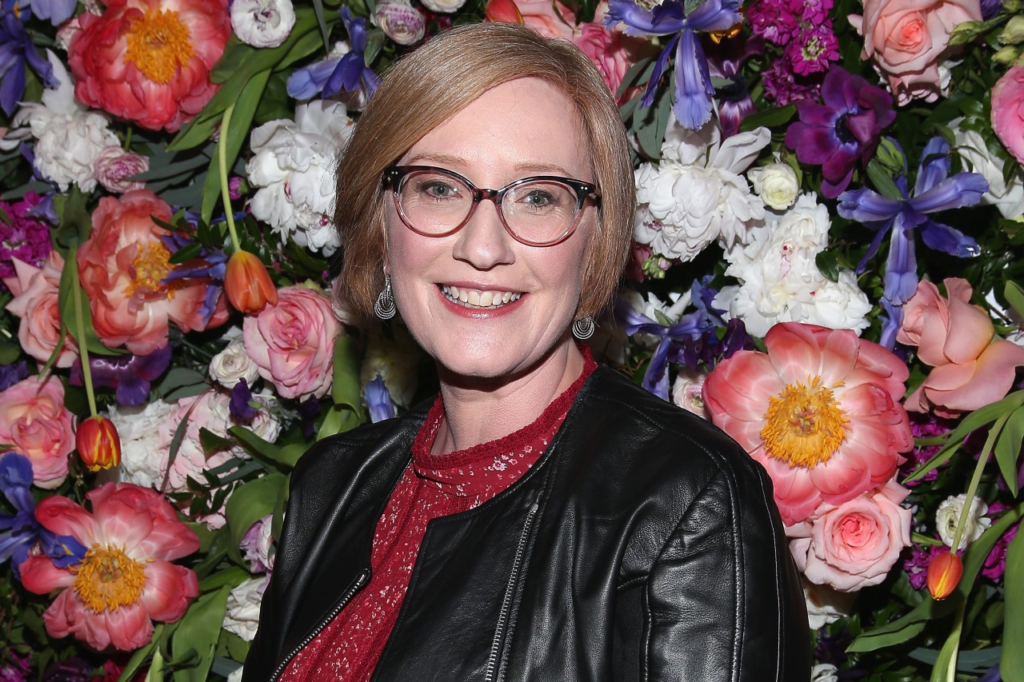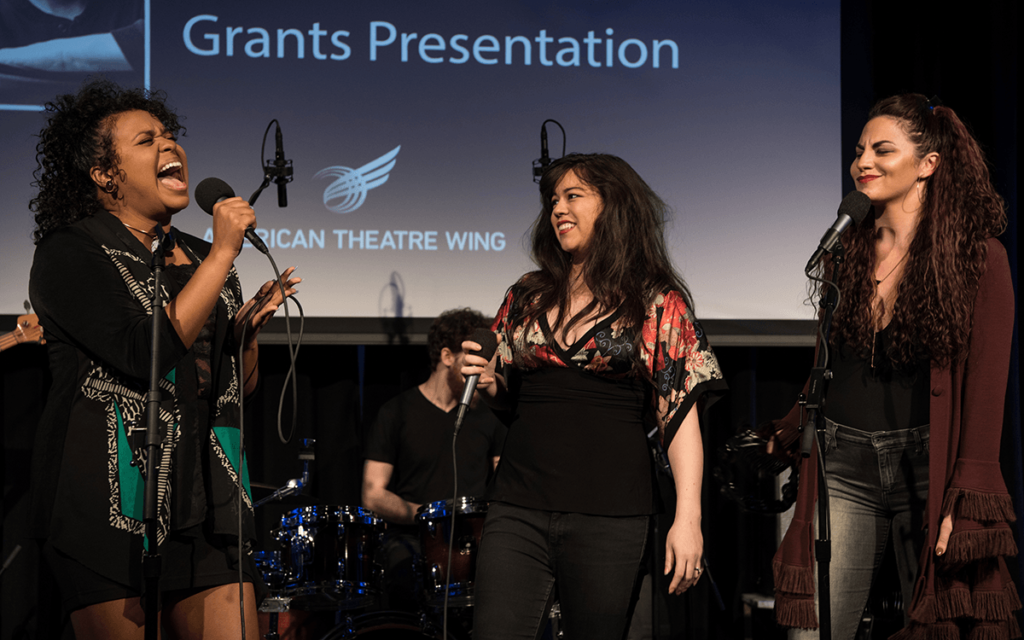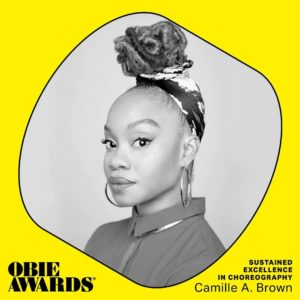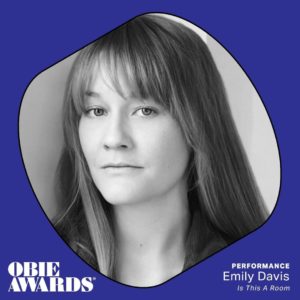
In Conversation w. Heather Hitchens
In Conversation with Heather Hitchens of American Theatre Wing
Athletics welcomes you to In Conversation, our series of discussions with colleagues and friends of the studio.
We’re joined by Heather Hitchens, President & CEO of the American Theatre Wing, New York’s premier arts organization dedicated to supporting excellence and education in theatre. Today Heather discusses American Theatre Wing’s latest events and grants, theater’s post-pandemic rebirth, and the upcoming Obie Awards.

Heather, thanks so much for joining us today. Tell us a little bit about your background and how you came to be the President and CEO of the American Theatre Wing
Heather: Well, I’m a musician by training. As a child I had music, art, and the school play from day one in elementary school and became interested in music first and went on to college and got my degree in music. While in college, I was interested in the business side of things and took some business courses. I ultimately ended up on the business side because I thought it was important to have people in leading institutions that actually did have the soul of an artist and that brought that soul of an artist with them. This is a superpower when you are dealing with various labor and negotiations and challenging relationships because the artistic mission of the organization drives decisions.
The American Theatre Wing is the fourth organization I’ve led. I led The Delaware Symphony, then came to New York and led Meet the Composer, which is a national service organization for composers now called New Music USA. And I was there for 11 years and then joined the Spitzer Paterson Administration to run the New York State Council on the Arts, where I served my four year term as the Appointed Executive Director of the New York State Council on the Arts.
I like to move faster than the state government and discovered the American Theatre Wing, which owned the Tony’s brand, but was largely an undeveloped institution, even though it was nearing, at that point, a hundred years old. So I became fascinated with that and the idea of working there because I had seen so much in the music business. My first job was at the American Music Theater Festival in Philadelphia. I had seen so much of the silos in our business, commercial, not for profit, big organization, small organization, and then artists out on an island by themselves, that I thought the American Theatre Wing was a place where some of those silos could be broken down because it really is the big tent of theatre with commercial, not for profit, and regional all under one roof, so that’s what brought me to The Wing.
Athletics: It’s amazing to hear that you are a business person with the foundational DNA of an artist and that is the superpower that you bring to The Wing. Tell us a little bit about their evolution and about the primary ways American Theatre Wing supports national theatre culture in general.
Heather: The American Theatre Wing actually began as the Stage Women’s War Relief founded on the eve of World War I by seven women of the theatre who were suffragists. They became one of the most influential and successful, impactful, relief organizations in the world raising 7 million dollars back in those days for soldiers. Then, in 1940, when another war was gaining traction, Antoinette Perry, who is Tony, was really taking over the leadership of the American Theatre Wing and the Stage Door Canteens were founded. But more importantly, she founded the American Theatre Wing School, which trained the likes of Angela Lansbury and James Earl Jones and that really began the focus of the Modern American Theatre Wing, which was about education and advancement of the theatre. She passed in 1947 and they created the Tony Awards in her honor. June was the 75th annual Tony Awards.
Athletics: Over the decades The American Theatre Wing have been able to evolve while maintaining their core mission. Most recently there have been challenges that resulted from the pandemic. How has the American Theatre Wing as a national theatre organization evolved and grown in recent years? And really how has it managed the more recent challenges?
Heather: I think the evolution has been really about doubling down on the training and pipeline development. Beyond the award shows, as we look at our industry and we look at the makeup of our industry and some of the equity issues of our industry, we thought that our real strength is focusing on our very impactful pipeline programs for students and young performers. We have the awards that recognize talent, but we’re not going to get there and we’re not going to have an American Theatre that looks the way we need it to look, that looks like the world that we’re living in, unless we invest in these pipeline programs. There’s a huge gap in this country between people who get an arts education and people who don’t. And basically, it’s based on people with resources.
There’s a study that the Americans for the Arts did. The majority of parents want their kids to have an arts education but arts education is extremely undervalued in our school system. The parents that have resources, if they have it in the school, great, but they’re supplementing that outside of the classroom and that’s where we have even more equity problems.
So the Andrew Lloyd Weber Initiative is targeted directly at that, so it’s three components. First it is grants to title one schools so they can do theatre. Some of these schools were trying to do things in the cafeteria. They didn’t have lights and sound. And so, we’re giving them lights and sound and solving a pipeline issue because we’re asking them to train them on the lights and sound, not just on stage because we want to have more sound designers, lighting designers. The next component has to do with training scholarships. When you show talent, you’re not going to be able to train to get into the business enough within a school setting likely. So this part of the initiative sends 6th graders through 12th graders to get advanced training outside of the school day. Third is university scholarships, which are partial scholarships from the American Theatre Wing. The key here is that they’re $10,000 a year for four years, but they’re paired with a mentor that is with them throughout their university experiences to help them make decisions to enter the industry. Because part of the equity problem was not only do you have the resources, but who you know.
That is just one program that exemplifies what we are doing. And all of our programs are really about not being one and done. We’re thinking systemically. Even with our Jonathan Larson program, which is a grant to young musical theatre writers, the winner of the Tony this year, Michael R. Jackson, received one in 2017. And it’s kind of a predictor in a way. When we invest, we invest deeply to engage the artistic community, the theatre community, in picking the recipients of our programs. It’s one of the best things to see the top industry people sit around a table and say, “We want to help this person.” I think partly exposing them to people that they might not have otherwise run across. So that’s what I think our superpower is and how we’ve evolved. And of course, we have other programs, but those are just a few prime examples.

Photo courtesy of American Theatre Wing
Athletics: Having worked with the American Theatre Wing for so long and knowing all of the areas you focus on, the grants, the awards, the training programs, the Tony’s, and the Obies are all very different, but unified under one larger mission. They all inform one another in a way.
Heather: Absolutely. Because we want to make sure that there’s a pipeline. And at the end of it, awards, people are like, are they important? They are important. They’re not perfect. Even the best processes aren’t perfect. And I have to sit there every year, and especially for the one that’s televised, and if it doesn’t go the way I think it should go to be like, oops. But this year, it mostly went the way I wanted it to go. But it’s not perfect, but it’s important. Acknowledgement of our artists’ work is important. And there are all kinds of issues around them, but I think they’re really important and they make or break people.
When Cicely Tyson was back on Broadway and in her nineties in Trip to Bountiful, and I was sitting in the theater and I thought, “Oh my God, she moves so well.” It was so moving to see that. I just had to sit in the theater afterward. And to see her win the Tony. In contrast, with the Obies there’s no commercialism at all. It’s just like this is about art. This is about moving the needle forward. It’s about, frankly, the advancement and the health and wellbeing of the art form.
Athletics: The 66th Annual Obie Awards this November and the American Theater Wing has been presenting the Obies since 2015 when we began developing the Obies brand with your team. Tell us a little bit about the history of the Obies and how The Wing became a part of it.
Heather: I think for a long time we had been thinking, “We are the American Theatre Wing, not the Broadway Theatre Wing.” And Broadway could not exist without Off-Broadway and Off-Off-Broadway and regional theater. We were often asked this question by others, and we were asking ourselves the question, “How do we support Off-Broadway?” Early in the Tony’s history, the Tony’s didn’t differentiate between Off-Broadway and Broadway. That changed over time. And there have been lots of discussions about should they? And I think I really landed, no. The Tony’s has a whole system. It needs to be that way because it is very much a commercial enterprise. It’s where art and commercialism hit in the sweet spot, but there’s real money at stake. What do they say about Broadway? You can’t make a living, but you can make a killing. The Tony’s are no different than the Oscars and the Grammys where people are trying to work it.
The Obies allowed us an opportunity to really recognize what the feeder is of a lot of the great innovation that is happening in theater. And there are no rules. The judges every year basically say, “Is this cool? This is cool.” And so, when The Village Voice was faltering and somebody came to our chair, and it was Michael Feingold who had run the Obies for many years, and said, “Would the American Theatre Wing do it?” It was like, this is perfect because it is. The Obies honors Off-Broadway, have the right spirit about it, and the only thing that we had to be careful of was to not “Tonify” it and we have done well.
Athletics: The brand we developed for the Obies retained the Obies “O” and wordmark but changes each year aesthetically to reflect the open and rebellious nature of it. We love the rebelliousness and the edginess of the Obies. There are no rules. I think that was born out of its origination in the late sixties and seventies. Has it always been rebellious?




Heather: Yes, it’s definitely been rebellious. And I remember having early conversations with Michael Feingold about, we want to keep it rebellious, we want to keep the booze flowing, we want to keep the floors sticky, but we do want to let people go home eventually. And he said, as we were saying, we don’t want to play people off like the Tony’s do. He said, “Well, one time we had to carry somebody off because they were too high.”
It’s always been that. And I think that’s the rebellious nature of Off-Broadway. And I think we’re looking at an evolution now, even, whether doing a formal awards ceremony, giving out the awards, is getting in the way of the party. And we might be leaning towards announcing the awards ahead of time and doing a concert and a party that lets people do their thing.
The Obies are also rooted in the spirit of The Village Voice. When we took it over, we didn’t own the trademark, we were licensing the trademark. Now, The Village Voice has since gone out of business. And the owners, the previous owners, have donated the trademark to us. And we are now the owner of the trademark. And we are the sole producer of the Obie awards.
Athletics: We are so excited for this year. I think people have gotten a handle on living in a kind of a mid-to-post pandemic sort of existence. More people are going to the theater. Tell us a bit about today as we are in a kind of reboot, rebirth, and renewal of theatre. What are you excited about as we enter into 2023 and beyond?
Heather: Well, I think that the pandemic is not over for the theatre community but particularly nonprofits. I think ’23, ’24, ’25 is going to actually be harder because there’s no PPP loans. So I think that is something that we have to continue to advocate for in terms of the state support and federal support and things like what we can do to uplift the theatre community. And I’m concerned about more edgier companies that don’t have essential cash flow. So looking at that is important.
The American Theatre Wing was one of the fortunate organizations during the pandemic because we are not a producer or presenter and we were able to use technology. And we’ve always been very savvy about technology. We’ve gotten a lot savvier. We were able to basically move things online with relative ease and keep the porch light on for theatre and keep things going.
Now, what I’m excited about going forward is to continue to leverage technology. For our theatre intern network we used to reach 40 to 50 young people in a room. During the pandemic, we were reaching hundreds of people internationally, and they were staying afterwards in chat rooms to connect with each other. So what I’m excited about is getting back to the live things, but not forgetting the use of the technology in terms of expanding our reach and mission. And truly, for us, it’s an opportunity to really live up to our name, The American Theatre Wing. And so that’s what I’m very excited about going forward. It’s great to see theatre back and people going into the theatre. It’s going to take some time.
I also think sometimes it takes a crisis, particularly on equity, what playwrights and composers are getting performed. And while I think that we’re still having conversations that I would prefer that we weren’t having, we’re having conversations in the industry that weren’t happening before. And so, I’m excited to help keep the sort of foot on the gas pedal because I think the more that we enrich, the more stories that we tell, the better off we’re going to be, the more people that are going to come to the theatre.
Athletics: Absolutely. And I think that’s what’s so exciting. With all the radical change and evolution happening in theatre, the American Theatre Wing is as important, if not more so, to keep that proverbial foot on the gas pedal. Thank you so much for your time Heather. The American Theater Wing has been an amazing creative partner for us and we love everything that you do. We are excited to see you at the Obies this year!